Better Living in Cities on the Agenda for WUF 4
 Half of the people on the planet live in cities and towns. One billion of these urban dwellers - 15 percent of the world’s population – wake up every morning inside slums, with thousands more joining them every day. Never before has the world witnessed such a rapid rate of urbanization, and never before has the plight of the urban poor become such a problem.
Half of the people on the planet live in cities and towns. One billion of these urban dwellers - 15 percent of the world’s population – wake up every morning inside slums, with thousands more joining them every day. Never before has the world witnessed such a rapid rate of urbanization, and never before has the plight of the urban poor become such a problem.As cities face growing pressures to provide basic services, such as clean water and sanitation, policy makers are realizing that global poverty must be addressed in cooperation with local communities. To do so, a wide-range of civic leaders, university researchers, private sector representatives, and non-governmental organizations gather every two years in a United Nations conference called the World Urban Forum.
On November 3-6, 2008 a new session will take place in Nanjing, China, an ancient capital home to six million people. This will be the fourth such conference since the first one was established in Nairobi, Kenya in 2002. The relatively informal session will provide thousands of people - 11,400 participated in the Third Session of the World Urban Forum organized by the Globe Foundation; in Vancouver in 2006 - to exchange ideas on how best to minimize poverty and improve quality of life in the world’s burgeoning cities.
On the agenda are roundtables where ministers, mayors, parliamentarians, youth and women will discuss issues that concern them directly. Mayors, for instance, will try to figure out how city managers can assist national governments in bringing about sustainable development. In particular, they will look for ways to convince federal legislators to delegate more power to them so that they can enforce change at the local level.
There also will be two-hour sessions for participants to share ideas about how their home countries approach urbanization. Seventy percent of Chinese cities, for instance, are located in areas prone to typhoons, storms, earthquakes and tsunamis. Experts will explain how China mitigates the risks of natural disasters in urban settings. CHF International, a non profit development organization, will show that some developing countries have turned slums into lively and safe communities that are now integrated within the urban fabric.
The Norwegian Association of Local and Regional Authorities will look at financial ethics by comparing cases in Norway and Tanzania. In Norway a water company manager misused funds and in Tanzania logs were illegally logged and exported. Both cases involved local governments. The German Development Cooperation will discuss innovative approaches for developing countries to access financial markets and private sector funds to improve their infrastructure.
Over 40 speakers have been invited to this year’s World Urban Forum. These include university professors, researchers and even politicians from Spain, Finland, Sri Lanka and the Philippines. The speakers include Barbara Norman, an urban and regional planning specialist from Australia and Jeffrey Sachs, an American economist who heads the Earth Institute at Columbia University in New York City.
The World Urban Forum 4 comes on the heels of World Habitat Day, also the brain-child of the United Nations Human Settlements Programme. The goal of World Habitat Day, which takes place every first Monday in October, is to remind everyone that we all need adequate shelter. Each year awards are bestowed on cities that have made special strides in improving the lives of residents. In 2008 Nanjing, China, was congratulated for installing a new waste management system and adopting measures to preserve the city’s historic sites.
The city can now host the World Urban Forum knowing that it is on the right track in providing better living conditions. But the metropolis cannot rest on its laurels. Two thirds of the world’s population is expected to live in cities by 2050. Nanjing will no doubt be impacted by this unprecedented growth.
It will have to compete with other municipalities for funds to improve access to clean water, build sturdier bridges and install pollution-control devices that keep foul from air spewing out of smokestacks. The World Urban Forum delegates will share concrete ideas in their conference rooms, but the key will be whether municipalities and national governments will be able to work together on the ground to bring a better future to their constituents.
For more information, check out the report of the Third Session of the World Urban Forum.
China hosts the Fourth World Urban Forum in November 2008.
For More Information: United Nations HabitatYou can return to the main Market News page, or press the Back button on your browser.

